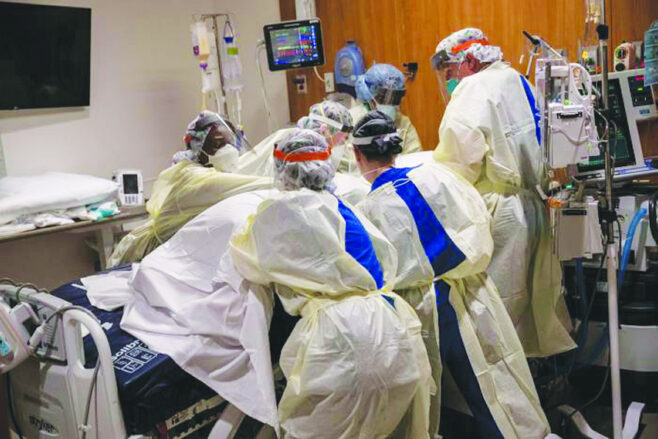It came from no less than the Prime Minister Justin Trudeau.
Canada is now battling a third wave of the COVID-19 pandemic.
Meanwhile, COVID-19 cases in the country have surpassed the one million mark as the third wave ripples across the nation.
Canada has recorded 1,001,650 cases since the start of the pandemic in 2020 as of the afternoon of April 3, 2021.
Canada, like other nations, is grappling with the spread of new virus variants.
The new infections are sending more people to hospital and resulting in stricter lockdown measures.
Canada’s hospitalisations are surging, intensive care beds are filling up, and COVID-19 variants are spreading.
“Around the world, countries are facing a very serious third wave of this pandemic,” Trudeau told a news conference on April 6.
“And right now, so is Canada,” Trudeau said.
On April 7, the US Centers for Disease Control and Prevention (CDC) issued a warning against travelling to Canada.
The CDC said the risk of COVID-19 in Canada was “very high”. It’s the agency’s highest alert level.
“Because of the current situation in Canada even fully vaccinated travelers may be at risk for getting and spreading COVID-19 variants and should avoid all travel to Canada,” the CDC said on its website.
Canada has averaged nearly 5,200 new coronavirus cases per day over the past recent days.
The country has also recorded a total of more than 23,000 deaths.
The province of Ontario entered a limited lockdown on April 3, but some local health officials were calling for more drastic measures.
Canadian provinces from Quebec to British Columbia, with the exception of Manitoba, are struggling against surging numbers of infections.
The federal government has delivered more than 10 million doses of coronavirus vaccine so far.
Trudeau has said everyone among 38 million Canadians who want to be vaccinated will get inoculated by the end of September.
As Philippine Showbiz Today went to press on April 7, 2021, Dr. Bonnie Henry, B.C.’s provincial health officer, and Adrian Dix, Minister of Health, issued a joint statement.
The statement said that Henry and Dix are reporting 997 new cases, including eight epi-linked cases, for a total of 106,985 cases in British Columbia.
There are 8,728 active cases of COVID-19 in the province, with 14,602 people under public health monitoring as a result of identified exposure to known cases.
A further 96,626 people who tested positive have recovered.
Of the active cases, 330 individuals are currently hospitalized with COVID-19, 105 of whom are in intensive care. The remaining people are recovering at home in self-isolation.
There have been two new COVID-19 related deaths, for a total of 1,491 deaths in British Columbia.
As of April 7, 946,096 doses of Pfizer-BioNTech, Moderna and AstraZeneca-SII COVID-19 vaccines have been administered in B.C., 87,504 of which are second doses. This is almost 20 percent of those who are eligible for a vaccine in B.C.
There are currently 3,766 confirmed COVID-19 cases that are variants of concern in B.C.
Of the total cases, 266 are active and the remaining people have recovered. This includes 2,837 cases of the B.1.1.7 (U.K.) variant, 51 cases of the B.1.351 (South Africa) variant and 878 cases of the P.1 (Brazil) variant.
“The COVID-19 pandemic has proven to be ever changing, and we are also continuing to evolve and adapt our pandemic response,” Henry and Dix said.
“As part of this, we are actively monitoring and screening for all of the virus strains to understand how they may impact us and what additional action may be required to keep our communities safe,” the two officials said.
Meanwhile in Ontario, the provincial government of Premier Doug Ford on April7 imposed a stay-at-home order, nearly one week after medical and public health experts recommended such a measure as COVID-19 cases and hospitalisations are surging.
Ford said he is “listening to health and science” but could not predict such a steep rise in coronarivus variants and intensive care admissions.
Ontario put limited curbs in place during the preceding weekend.
On April 7, Ontario reported 3,215 new cases and a seven-day average of 2,988 – up from 3,065 new cases.
The province also announced a seven-day average of 2,862 a day earlier – and health experts have raised concerns about the rapid spread of coronavirus variants.
“Even the people that were showing us the charts and where we were going … the capacity at the ICUs and these variants have taken off even beyond what they told us,” Ford said during a news conference.
The stay-at-home order will come into effect at 12:01am local time (04:00 GMT) on Thursday (April 8). It requires Ontarians to leave their homes only to get essential goods and services, or to go to work.
Non-essential retail stores will be closed except for curbside pick-up; stores deemed essential, such as pharmacies and groceries, will be allowed to sell only essential items; and residential evictions will be suspended, Ford said.
“To boil it down: folks, please, unless it’s for an essential reason, please stay home. We just need to hunker down right now. We need to limit mobility,” Ford said.








